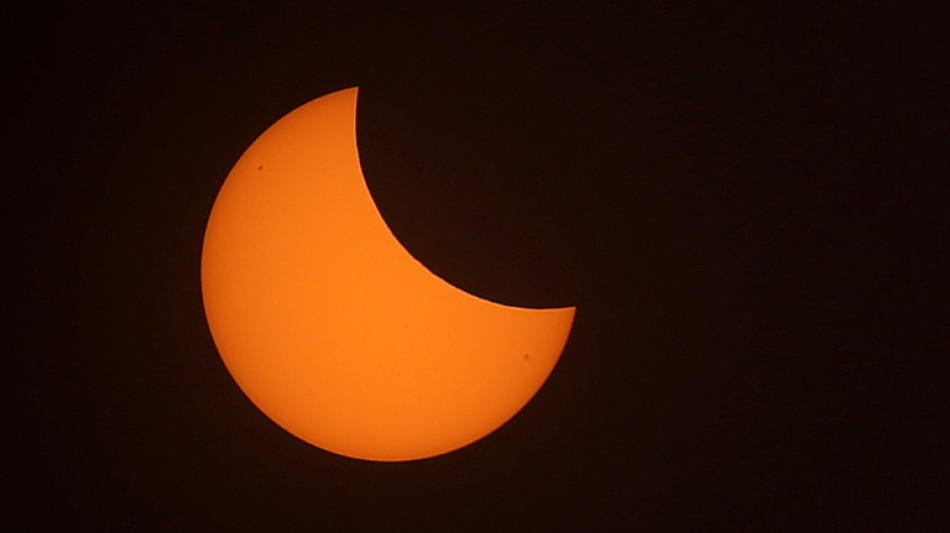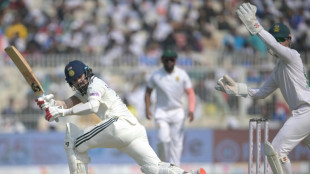
-
 Reyna, Balogun on target for USA in 2-1 win over Paraguay
Reyna, Balogun on target for USA in 2-1 win over Paraguay
-
Japa's Miura and Kihara capture Skate America pairs gold

-
 Who can qualify for 2026 World Cup in final round of European qualifiers
Who can qualify for 2026 World Cup in final round of European qualifiers
-
UK to cut protections for refugees under asylum 'overhaul'

-
 England's Tuchel plays down records before final World Cup qualifier
England's Tuchel plays down records before final World Cup qualifier
-
Depoortere double helps France hold off spirited Fiji

-
 Scotland face World Cup shootout against Denmark after Greece defeat
Scotland face World Cup shootout against Denmark after Greece defeat
-
Hansen hat-trick inspires Irish to record win over Australia

-
 Alcaraz secures ATP Finals showdown with 'favourite' Sinner
Alcaraz secures ATP Finals showdown with 'favourite' Sinner
-
UK to cut protections for refugees under asylum 'overhaul': govt

-
 Spain, Switzerland on World Cup brink as Belgium also made to wait
Spain, Switzerland on World Cup brink as Belgium also made to wait
-
Sweden's Grant leads by one at LPGA Annika tournament

-
 Scotland cling to hopes of automatic World Cup qualification despite Greece defeat
Scotland cling to hopes of automatic World Cup qualification despite Greece defeat
-
Alcaraz secures ATP Finals showdown with great rival Sinner

-
 England captain Itoje savours 'special' New Zealand win
England captain Itoje savours 'special' New Zealand win
-
Wales's Evans denies Japan historic win with last-gasp penalty

-
 Zelensky renews calls for more air defence after deadly strike on Kyiv
Zelensky renews calls for more air defence after deadly strike on Kyiv
-
NBA's struggling Pelicans sack coach Willie Green

-
 Petain tribute comments raise 'revisionist' storm in France
Petain tribute comments raise 'revisionist' storm in France
-
Spain on World Cup brink as Belgium also made to wait

-
 Spain virtually seal World Cup qualification in Georgia romp
Spain virtually seal World Cup qualification in Georgia romp
-
M23, DR Congo sign new peace roadmap in Doha

-
 Estevao, Casemiro on target for Brazil in Senegal win
Estevao, Casemiro on target for Brazil in Senegal win
-
Ford steers England to rare win over New Zealand

-
 Massive march in Brazil marks first big UN climate protest in years
Massive march in Brazil marks first big UN climate protest in years
-
Spain rescues hundreds of exotic animals from unlicensed shelter

-
 Huge fire sparked by explosions near Argentine capital 'contained'
Huge fire sparked by explosions near Argentine capital 'contained'
-
South Africa defy early red card to beat battling Italy

-
 Sinner beats De Minaur to reach ATP Finals title match
Sinner beats De Minaur to reach ATP Finals title match
-
Zelensky vows overhaul of Ukraine's scandal-hit energy firms

-
 South Africa defy early red card to beat Italy
South Africa defy early red card to beat Italy
-
Alex Marquez claims Valencia MotoGP sprint victory

-
 McIlroy shares lead with Race to Dubai title in sight
McIlroy shares lead with Race to Dubai title in sight
-
Climate protesters rally in Brazil at COP30 halfway mark

-
 Spike Lee gifts pope Knicks jersey as pontiff meets film stars
Spike Lee gifts pope Knicks jersey as pontiff meets film stars
-
BBC caught in crossfire of polarised political and media landscape

-
 'Happy' Shiffrin dominates in Levi slalom for 102nd World Cup win
'Happy' Shiffrin dominates in Levi slalom for 102nd World Cup win
-
Palestinian national team on 'mission' for peace in Spain visit

-
 Brazilian 'Superman' cheers child cancer patients in Ghana
Brazilian 'Superman' cheers child cancer patients in Ghana
-
India close in on win over South Africa after Jadeja heroics

-
 Huge explosions rock industrial area near Argentina's capital
Huge explosions rock industrial area near Argentina's capital
-
Bezzecchi takes pole for Valencia sprint and MotoGP

-
 Dominant Shiffrin leads after first slalom run in Levi
Dominant Shiffrin leads after first slalom run in Levi
-
Nine killed in accidental explosion at Indian Kashmir police station

-
 Climate protesters to rally at COP30's halfway mark
Climate protesters to rally at COP30's halfway mark
-
Fighting South Africa lose Rickelton after India 189 all out

-
 Harmer leads South Africa fightback as India 189 all out
Harmer leads South Africa fightback as India 189 all out
-
Prison looms for Brazil's Bolsonaro after court rejects his appeal

-
 EU bows to pressure on loosening AI, privacy rules
EU bows to pressure on loosening AI, privacy rules
-
India close in on lead despite South African strikes


Partial solar eclipse to cross swathe of Northern Hemisphere
Skygazers across a broad swathe of the Northern Hemisphere will have a chance to see the Moon take a bite out of the Sun on Saturday when a partial solar eclipse sweeps from eastern Canada to Siberia.
The partial eclipse, which is the first of the year and the 17th this century, will last around four hours from 0850 GMT to 1243 GMT.
Curious observers making sure to protect their eyes might be able to see the celestial show in most of Europe, as well as in some areas of northeastern North America and northwest Africa.
Eclipses occur when the Sun, Moon and Earth all line up. When they perfectly align for a total solar eclipse, the Moon fully blots out the Sun's disc, creating an eerie twilight here on Earth.
But that will not happen during Saturday's partial eclipse, which will instead turn the Sun into a crescent.
"The alignment is not perfect enough for the cone of shadow to touch the Earth's surface," Paris Observatory astronomer Florent Deleflie told AFP.
Because that shadow will "remain in space, there will not be a total eclipse anywhere" on Earth, he said.
At most, the Moon will cover around 90 percent of the Sun's disc. The best view will be from northeastern Canada and Greenland at the peak time of 1047 GMT.
- Beware eye damage -
It will be less spectacular in other areas. In France, for example, between 10 to 30 percent of the Sun's disc will be obscured, depending on the region.
Ireland will see around 40 percent, according to Sophie Murray of the Dublin Institute of Advanced Studies. However rain is forecast.
These smaller percentages of eclipse will not be visible to the naked eye.
However, if the sky is clear, skygazers will be able to watch the eclipse through special viewers -- as long as they take precautions.
Looking straight at the Sun -- during an eclipse or otherwise -- can lead to irreversible vision loss.
Skygazers are advised to buy eclipse-viewing glasses and ensure they are in good condition.
Even a slight defect or "microscopic hole" can cause eye damage, Deleflie warned.
Or, people could watch the eclipse at a local astronomy observation centre where "you can safely verify the precision of celestial mechanics and marvel at interesting details on the Sun's surface, such as sunspots", Deleflie said.
Murray offered another option.
"You can make a simple pinhole projector by poking a small hole in a piece of paper or cardboard and letting sunlight pass through it onto the ground or another surface, where you'll see a small, inverted image of the eclipsed Sun," she said.
The partial eclipse will not turn up on a smartphone camera without a suitable filter, Deleflie added.
The latest celestial show comes two weeks after skygazers across much of the world marvelled at a rare total lunar eclipse, dubbed a "Blood Moon".
These events often happen after each other because the Moon has "completed a half-circle around the Earth in the meantime, reversing the configuration", Deleflie explained.
A greater spectacle is expected on August 12, 2026, when a total solar eclipse will be visible in Iceland, northern Spain and parts of Portugal.
More than 90 percent of the Sun will also be obscured in areas of Europe including Britain, France and Italy.
It will be the first total solar eclipse since one swept across North America in April 2024.
Z.AlNajjar--SF-PST




